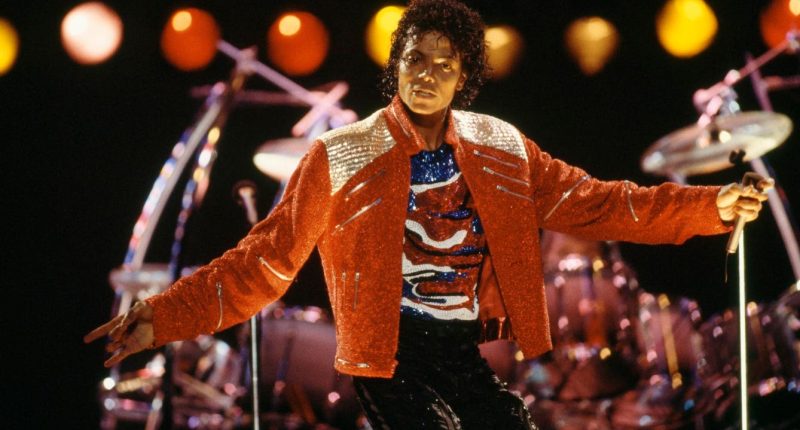Share this @internewscast.com
American singer Michael Jackson (1958 – 2009) performing on stage, circa 1987. (Photo by Dave … More
Getty Images
As 16 years since the untimely death of Michael Jackson near the sunset, it’s fair to reflect on the phenomenal era that marked the prime of his solo career in the 1980s.
By the early 1980s, it was evident to anyone paying attention that the sensational young man and lead singer of the Jackson 5 had outgrown the velvet ropes of Motown adolescence. Michael Jackson was no longer the cherub-faced prodigy in matching jumpsuits harmonizing alongside his brothers, he was an artistic force ready to break the mold of the child star. His solo juncture was not a detour from the Jackson family legacy, it moreover enhanced it and served as a cultural and commercial overdrive that would redefine global stardom and recalibrate the power of Black artistry in pop culture.
By 1984, Michael Jackson wasn’t just a star. He was a spectacle. An enigma. He had that rare, alchemical power to stop time, command tears, and quite literally make people faint just by existing in the same space. Fans routinely collapsed at his concerts, an act that swindled into the 1990s. To be in the same dwelling as him wasn’t just a thrill, it was a spiritual experience for many.
American singer, songwriter, record producer and entertainer known as the King of Pop, Michael … More
Sygma via Getty Images
By early 1984, Thriller, which dropped in December 1982, had already moved over 30 million copies worldwide. With seven of its nine tracks hitting Billboard’s Top Ten, Thriller amalgamated the lines of genre, form and grandly, that of race leading Black music back to its natural position of the forefront amid the clouds of being marginalized. The record breaking identity of Thriller was too excessive to ignore. Michael ultimately set new industry standards.
His corporate collaborations, especially with Pepsi, weren’t just promotional efforts. They were strategic alliances that expanded his brand into previously untapped markets. The “Victory” tour, which featured Michael and his brothers, became one of the most heavily funded and anticipated tours in music history. And the highly publicized hair burning accident couldn’t deter the then 26-year-old Michael. A master showman, he pushed forward and the world witnessed the little boy of the Jackson Five showcase a resilience that became signature to his professional repertoire.
That repertoire, however, was never one-dimensional. He was deeply spiritual, modest in his personal habits, and introverted offstage. Yet onstage, he was electrifying, cinematic, sensual, and surreal. This dichotomy was no mere affectation. It was a reflection of his complex nature that was intensely captivated by consumers and critics alike.
NEW YORK, NY – FEBRUARY 7: Michael Jackson accepts an award from CBS and The Guinness Book Of World … More
Getty Images
Long before celebrity endorsements became a standard playbook move, Michael brokered that groundbreaking $5 million deal with Pepsi, an alliance that didn’t just slap his face on a can, but rewrote the rules of music-brand synergy. This wasn’t about slinging soda. It was about embedding a global pop icon with massive appeal into the corporate bloodstream. The campaign, along with its cinematic ads and cross-promotion of the Victory tour, marked the beginning of the superstar-as-multinational brand.
Tito Jackson, Jackie Jackson, Marlon Jackson, Jermaine Jackson, Randy Jackson and Michael Jackson of … More
Ron Galella Collection via Getty Images
The Victory tour itself was a masterclass in scale and strategy. Estimated to gross up to $100 million, it was a hybrid of music, merchandising, and media spectacle. Fans weren’t just buying concert tickets, they were purchasing access to an entire ecosystem which granted them limited-edition tour jackets, commemorative dolls, video specials, and the mythos of a pop deity. Michael and his brothers secured 85% of the tour’s net profits, while Michael’s personal record royalties, reportedly around $2 per album sold, cemented his position as one of the most financially empowered artists in music history. At a time when Black musicians were still fighting for fair contracts, and Michael’s deals were beyond being lucrative and were rather revolutionary.
Popular American musician Michael Jackson (1958 – 2009) stands in a graffiti-filled subway car … More
Getty Images
That signature mystique of Jackson carried weight. With just a look, a gesture, a lean into the spotlight, he could stir millions. Even rumors of his arrival in a city could send people into euphoric chaos. He operated at a frequency few could even comprehend. The distance he maintained from everyday celebrity culture only fueled the allure. He was present, yet untouchable, and seen, but rarely understood.
Michael Jackson didn’t just go solo. He curated a whole entire universe around his persona out of rhythm, maturity, and reinvention. The mania of the 1980s wasn’t just about a man. It was about the way that man, the King of Pop, bent time, culture, and commerce to his will. It was about the arrival of a new era, one where Black brilliance reigned supreme.









